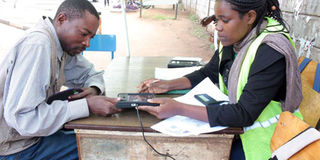Exploit ICT fully to deliver credible elections in August

Mr James Nduati verifies his voter details at Moi Avenue Primary School in Nairobi on May 22, 2017. The IEBC will need to sensitise the public about the technology in use and also have comprehensive capacity building for the personnel. PHOTO | DENNIS ONSONGO | NATION MEDIA GROUP
What you need to know:
- Effective integration of ICT will be critical in ensuring the success of the August 8 poll.
- The Constitution of Kenya under Article 86 vouches for an election system that is accurate and transparent.
Though Africa has implemented wide-ranging political reforms, frequent election crises demonstrate the constant struggles that characterise the journey towards the realisation of democratic ideals.
In less than three months’ time, the country will hold a general election.
Indeed, previous electoral misadventures have had profound consequences for our nation.
PUBLIC CONFIDENCE
The controversial 2007 elections that left more than a thousand people dead and hundreds of thousands displaced, tragically bear the truth that public confidence in an electoral system is crucial in any modern democratic society.
The clamour for fair, transparent and credible elections continues.
Regrettably, public confidence in institutions continues to wane.
DEMOCRACY
Information communication technology (ICT) is a potent tool for restoring the credibility, reliability and integrity of institutions.
Effective integration of ICT will be critical in ensuring the success of the August 8 poll.
Whereas traditional media such as radio and television have played a significant role in elections and democracy, ICT has radically transformed the information arena.
The ability to communicate to the masses in real time, to seamlessly connect citizens has many implications for democracy and elections, in particular.
ELECTORAL FRAUD
To transcend deficiencies of the past, the Constitution of Kenya under Article 86 vouches for an election system that is simple, accurate, verifiable, secure, accountable and transparent.
ICT can mitigate electoral fraud, document irregularities and to hold officials accountable.
Parliament has been steadfast in laying down the legislative framework for the use of ICT in elections.
Key efforts include amendments to the Elections Act and the approval of the Elections (Technology) Regulations.
TECHNOLOGICAL HITCHES
Properly effected, these legal provisions could significantly eliminate the systemic or institutional loopholes for electoral malpractices.
This could inspire public confidence, and stem discontent that would trigger protests.
The starting point in eliminating uncertainties and risks around the electoral technology in use is the disclosure that no system is entirely immune to operational complexities.
Even the best system can be beset by functional problems.
However, meticulous planning has made it possible to deploy technology in a flawless manner.
RELIABILITY
The breakthrough lies not in the technology tools applied but in the cumulative impact of mechanisms engaged to appropriately blend all the elements within the electoral chain.
Of concern is whether IEBC has conducted an analysis to determine the specific technology needs that would ensure integrity of the election process.
It will clear aspersions that have been cast with regard to how the agency executed the electoral technology procurement.
Securing a service level agreement that guarantees utmost reliability is an imperative.
CIVIC EDUCATION
Precise benchmarks for a comprehensive testing of election technology must be established.
Quality assurance checks to affirm system stability, security, data integrity, accuracy and completeness of records are inevitable if the system is to duly meet its objectives.
There is a need for a sound operations continuity plan that details the fallback procedures should the system malfunction or some of its components fail to work.
Besides, the IEBC will need to sensitise the public about the technology in use and also have comprehensive capacity building for the personnel.
UNINTERRUPTED NETWORK
This way, user related challenges that would diminish the benefits of the technology will be eliminated.
Inordinate delays in election result transmission fairly contribute to tension and inflame citizen passions, with disastrous consequences.
To avert this, it will be necessary to make arrangements with telecommunication service providers to guarantee full-scale availability of network signal throughout the election period.
Mr Njenga is a policy and strategy analyst. [email protected]




